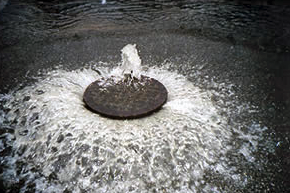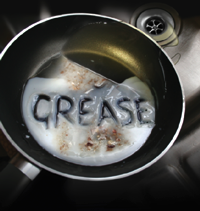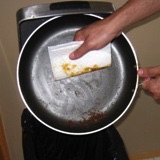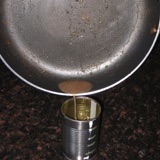Fats, Oil, and Grease - FOG
Many sanitary sewer backups and clogs are caused by excessive Fats, Oils, and Grease (FOG) being improperly disposed of. The majority of FOG blockages occur when cooking oils and grease are disposed of down the drain and coat the inside sewer pipes. This sticky coating collects more fats, grease, and oils and other debris and eventually forms a clog.
The LSDC has adopted a Fats, Oils, and Grease (FOG) policy intended to provide residents and business owners with the proper tools and knowledge needed to prevent sanitary sewer pipe blockages that cause backups and sanitary sewer overflows. The goal of the program is to educate residents to understand that the proper disposal of grease and other FOG forming foods is in the garbage, rather than in the sink or toilet.
FOG Prevention
Your help is needed to stop these blockages from occurring. Dealing with overflows and blockages is very expensive for homeowners and the LSDC but prevention is cheap.
Here are some easy steps to make sure fats, oils, and grease do not make it into our sanitary sewer system:

What is FOG?
Fats, Oils, and Grease (FOG) are a byproduct of cooking, food and drink preparation, and meat preparation. FOG is generated from meat fats, shortening, butter, margarine, sauces, and dairy products.
Grease in a warm liquid may not appear harmful. But, as the liquid cools, the grease or fat congeals on the surface of pipes and other surfaces. When FOG products are washed down the drain from cookware, utensils and other means, they can impact both household plumbing and the sewer collection system.
Common sources of FOG include cooking oil, butter and margarine, meat drippings, salad dressing, shortening, gravy and mayonnaise.
Why is FOG a problem for me?
FOG can block interior plumbing and sewer lines. When FOG cools down, it congeals and hardens, and will build up on the inside of pipes and sewer lines. Eventually, the build up of FOG will block the line and potentially result in sewer overflows into the property, nearby homes and businesses, and local waterways. This overflow potentially causes property damage, loss of business and severe public health impacts. Overflows impacting public health, wastewater, and storm drains may result in expensive cleanup costs as well as fines from regulatory agencies. When FOG occurs on the homeowner's property it is the property owner's responsibility to repair and clean up.
Do's and Don'ts of FOG

For Homes
• Never pour grease down sink drains, garbage disposals or into toilets. Use a grease can or jar for hot grease and oil and dispose of it in the trash once it's cooled.
• Use a paper towel to clean up the excess grease residue left on pots, pans and utensils. Dispose of this greasy towel into the trash.
• Scrape all food scraps from trays, plates, pots, pans, utensils and any cooking surface directly into the the trash for disposal.
• Throw meat scraps, fat and skin in the garbage can, not the garbage disposal
• Talk with your family, friends, and neighbors about some easy steps that they can take to help prevent fats, oils and grease from getting into our sanitary sewer system.
For Restaurants
• Train your kitchen staff to use the best management practices for cleanup and grease disposal.
• Conspicuously post no grease signs near drains and sinks.
• Recycle waste cooking oil.
• Clean under sink grease traps weekly.
• Clean outdoor grease traps monthly.
• Keep accurate records of grease trap maintenance. Include dates, amounts, disposal methods, and service staff.



DO
Can the grease Keep an empty metal can glass jar and pour oil and grease into the can. Allow grease to cool in the container before throwing it in the trash.
Wipe before washing For greasy pans, pour the grease into a container and use a paper towel to wipe out the remaining grease in the pan prior to washing.
Seal the oil Liquid should be limited to no more than one-half gallon. Mix liquid vegetable oil with an absorbent material such as kitty litter or coffee grounds in a sealable container before throwing it in the trash.
Keep drains clean Pour 1/2 cup of baking soda down the drain followed by 1/2 cup of white vinegar. Wait 10-15 minutes and then rinse with hot water.
DON'T
Rely on the garbage disposal to get rid of grease. It is a common myth that this is a proper way of disposing of fats, oil and grease. A garbage disposal only grinds up food products, it does not help FOG go down the drain.
Pour FOG down the drain Fat, oil or grease or any other liquid foods (syrups, batters, gravy, etc.) down the drain
Rinse with hot water or rely on dish soap to to remove grease from cookware, utensils, dishes or surfaces. As soon as it reaches a cooler part of your plumbing it will harden and sick to pipes.
Pour off cool liquid cooking oils, like olive oil and vegetable oil own the drain. These oils float on top of wastewater and stick to pipes.
Use chemicals to remove grease clogs; they can damage the piping system.
